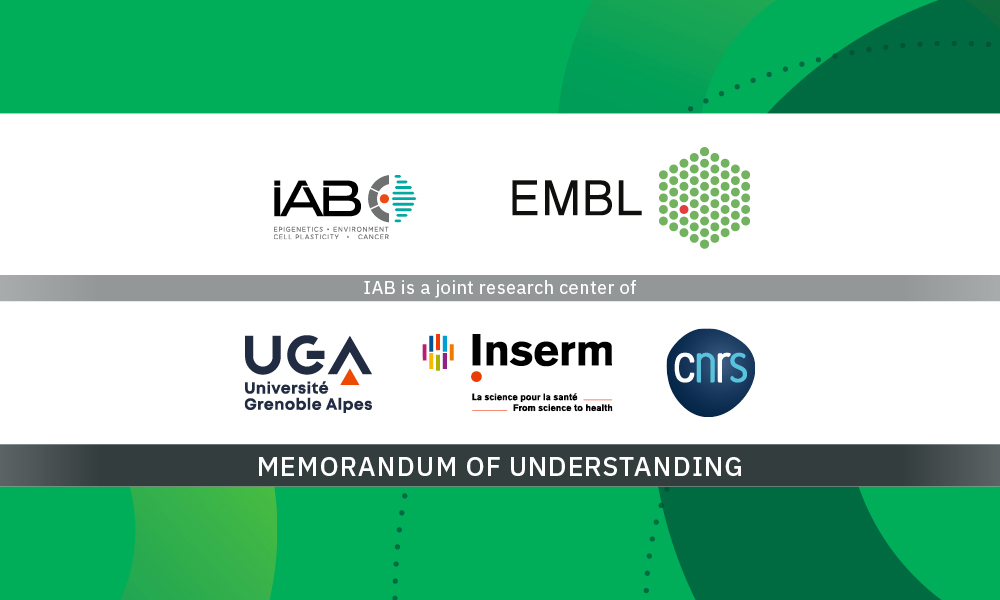This collaboration strengthens Grenoble as a European research centre in the life sciences

The European Molecular Biology Laboratory (EMBL) and the Institute for Advanced Biosciences (IAB, a joint research centre of Inserm, the CNRS, and Université Grenoble Alpes) have signed a memorandum of understanding, formalising a 15-year collaboration between the two institutes. This collaboration strengthens Grenoble as a European research centre in the life sciences.
The aim of the agreement between EMBL and IAB is to bring together a common vision and scientific programme around the theme 'From molecules to ecosystems', which integrates the study of the mechanisms of life at the level of biological macromolecules in the cell to populations of organisms in their environment. The complementarity of the two institutes represents a continuum of multidisciplinary expertise.
EMBL is an intergovernmental organisation supported by 30 countries, and has six sites across Europe. EMBL's site in Grenoble, France, offers expertise and facilities in structural biology to enable scientists to better understand the biology of RNA and infectious diseases, in particular the protein-RNA complexes involved in gene expression and host-pathogen interactions. IAB is developing a set of fundamental and translational research programmes in the fields of epigenetics, the environment, and cell plasticity, and applying these to research on cancer, parasitic infections, infertility, and environmental effects during the early stages of life.
The new international collaboration will promote this vision through a series of joint projects, training and visitor programmes for young researchers, high-level seminars, and activities to disseminate knowledge to students and the public.
The agreement also promotes access to the two institutes' state-of-the-art research facilities and equipment. This alliance therefore fits perfectly within Grenoble's scientific ecosystem, which is geared towards collaborative research, innovation, and human health. EMBL Grenoble has strong connections with the institutes on the European Photon and Neutron (EPN) Science Campus via the Partnership for Structural Biology (PSB), which includes EMBL, the European Synchrotron Radiation Facility, the Institut Laue-Langevin, and the Institut de Biologie Structurale. The PSB offers a wide range of cutting-edge technologies such as cryo-electron microscopy, robotics for operating synchrotron beamlines, and high-speed crystallography for drug design. The strong links between IAB and Grenoble Alpes University Hospital will enable the joint development of discoveries with a view to applying them to advance human health, particularly in the field of gene expression and the mechanisms linked to the development of cancer and infectious diseases.
"EMBL and IAB are natural partners," explains Head of EMBL Grenoble Stephen Cusack, who, together with EMBL Group Leader Marco Marcia, co-ordinates the joint activities with Saadi Khochbin, Head of the Epigenetics Department at IAB. "This memorandum of understanding makes it possible to link within the two organisations the whole range of research, from the atomic study of molecules to human medicine. It is a further step that makes Grenoble an important place for research in the life sciences."
IAB and EMBL Grenoble have a long history of collaboration in exploring the fundamental mechanisms of biology. "More than 15 years of close and intense scientific collaboration between IAB and EMBL Grenoble have led to remarkable scientific breakthroughs in the regulation of gene expression. These successes have been built on a generation of leaders of international standing, now relayed by a talented, creative, and highly motivated young generation," explains Pierre Hainaut, Director of IAB.
The research carried out jointly by the two institutes will have an impact on the entire knowledge chain. It will provide a better understanding of the mechanisms by which the environment and social vulnerabilities impact cells and gene expression, and how biological systems adapt to environmental constraints, particularly during the development of diseases. This research could lead to the identification of new biomarkers of disease and new targets of therapeutic interest for personalised medicine, and it opens the door to new concepts for disease prevention and healthy living in a changing world.
"The current COVID-19 pandemic, generated by an RNA virus, makes us realise how important it is to understand both the behaviour of RNA in the cell and the zoonotic processes that make it possible for this virus to infect the whole world. This collaboration will develop an integrated understanding of the molecular basis right down to the level of people suffering from infectious diseases or cancers. This union will create enormous opportunities for both institutes," says EMBL Director General Edith Heard.






